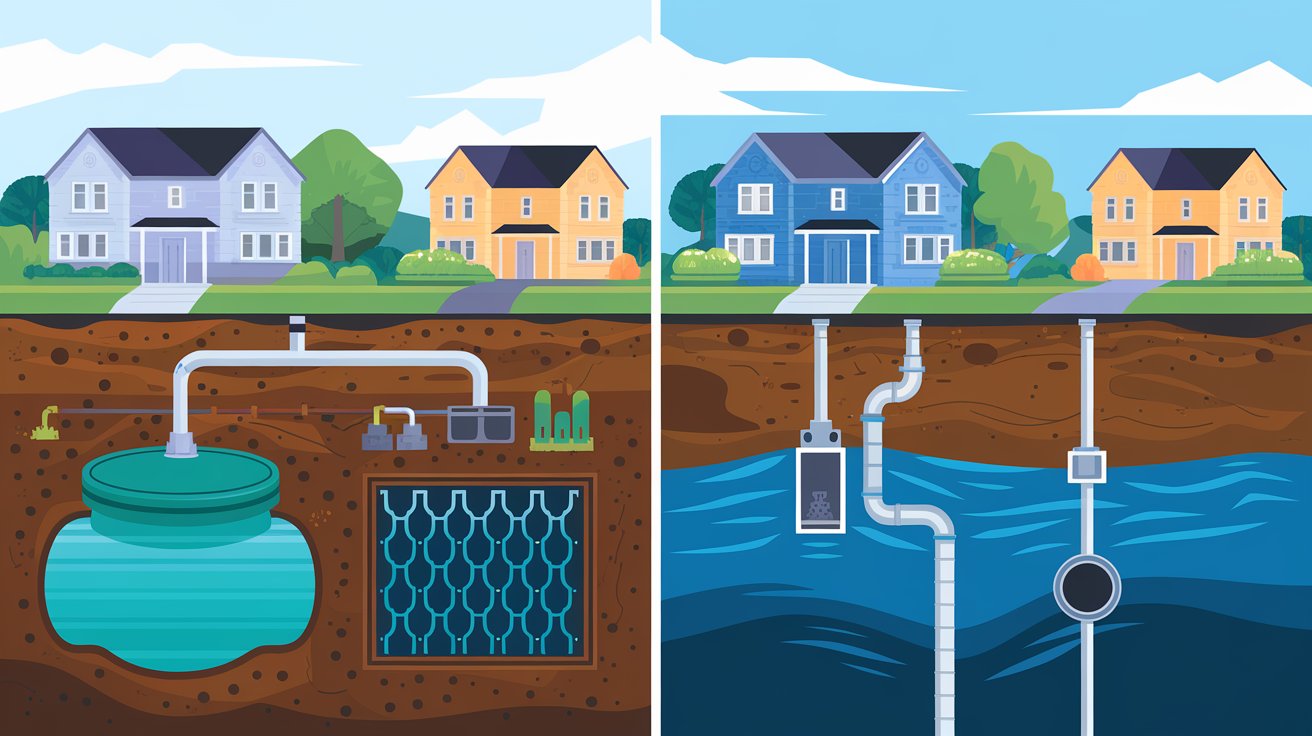When it comes to managing household wastewater, homeowners often face a crucial decision between two primary systems: septic tanks and sewer systems. This choice is essentially about evaluating septic tanks vs. sewer systems, as both options have their advantages and disadvantages. Understanding these differences is essential for making an informed choice. In this article, we will delve into the workings, benefits, and drawbacks of each system, helping you decide which is best suited for your needs.
Table of Contents
- Overview of Septic Tanks
- Overview of Sewer Systems
- Comparison of Septic Tanks and Sewer Systems
- Choosing the Right Option
- Local Regulations and Environmental Conditions
- Future Developments in Wastewater Management
- Community Impact
- Economic Factors
- Environmental Considerations
- Maintenance and Troubleshooting
- Septic Permit Links by State
Wastewater management is a critical aspect of maintaining a healthy environment and ensuring public health. Proper disposal and treatment of wastewater prevent the spread of diseases and protect water sources from contamination. Both septic tanks and sewer systems play vital roles in this process, but they operate in distinct ways.
Overview of Septic Tanks
How Septic Tanks Work
Septic tanks are self-contained systems that treat wastewater on-site. They work by separating solid waste from liquid waste, allowing the liquid to flow into a drainfield where it is filtered and purified by the soil. This process involves several key steps:
- Wastewater Entry: Wastewater from the home enters the septic tank through an inlet pipe.
- Separation: Inside the tank, wastewater separates into three layers: scum (fats, oils, and greases) at the top, effluent (liquid wastewater) in the middle, and sludge (solid waste) at the bottom.
- Bacterial Action: Anaerobic bacteria in the tank break down organic matter, reducing the volume of sludge.
- Effluent Discharge: The treated effluent flows out of the tank into the drainfield.
- Drainfield Filtration: The effluent is further purified as it passes through the soil in the drainfield, removing pathogens and nutrients before it reaches groundwater.
Advantages of Septic Tanks
- Cost-Effective: Initial installation costs can be lower compared to connecting to a sewer system.
- Environmentally Friendly: Properly maintained systems can be environmentally friendly, as they treat wastewater naturally.
- Independence: Not reliant on municipal infrastructure.
Disadvantages of Septic Tanks
- Maintenance Requirements: Regular pumping and inspections are necessary to prevent failures.
- Space Requirements: Need a suitable area for the drainfield.
- Potential for Failure: If not properly maintained, can lead to costly repairs and environmental issues.
Maintenance Considerations
Regular maintenance is crucial for septic tanks. This includes:
- Pumping: Removing sludge and scum from the tank every 3-5 years.
- Inspections: Regularly checking the system for signs of failure or malfunction.
- Water Conservation: Reducing water usage to prevent overloading the system.
By understanding how septic tanks work and their advantages and disadvantages, homeowners can make informed decisions about whether a septic tank is the right choice for their wastewater management needs.
Overview of Sewer Systems
How Sewer Systems Work
Sewer systems collect wastewater from homes and transport it to a central treatment facility. This process involves a network of underground pipes that connect households to the municipal sewage infrastructure. Sewer systems are generally more reliable and require less maintenance than septic tanks.
Advantages of Sewer Systems
- Low Maintenance: Once connected, maintenance is handled by the municipality.
- Reliability: Less prone to failures compared to septic systems.
- Scalability: Easily accommodates growing populations.
Disadvantages of Sewer Systems
- Connection Costs: Can be expensive to connect to the system.
- Dependence on Infrastructure: Requires a functioning municipal infrastructure.
- Environmental Impact: Large-scale treatment facilities can have significant environmental impacts.
Comparison of Septic Tanks and Sewer Systems
When comparing septic tanks vs. sewer systems, several factors come into play:
- Cost: Septic tanks may have lower upfront costs but require regular maintenance, while sewer systems have higher connection fees but are generally low maintenance.
- Environmental Impact: Both systems can be environmentally friendly if properly managed, but sewer systems rely on large-scale treatment facilities.
- Reliability: Sewer systems are typically more reliable, but septic tanks offer independence from municipal infrastructure.
Choosing the Right Option
The decision between septic tanks and sewer systems depends on your specific needs and circumstances. If you prefer a cost-effective, environmentally friendly option with independence from municipal infrastructure, a septic tank might be the better choice. However, if you prioritize reliability and low maintenance, a sewer system could be more suitable.
Local Regulations and Environmental Conditions
When deciding between septic tanks and sewer systems, it’s also important to consider local regulations and environmental conditions. For instance, areas with high water tables or poor soil quality may not be suitable for septic systems, while regions with well-developed municipal infrastructure might favor sewer connections.
Future Developments in Wastewater Management
As technology advances, both septic tanks and sewer systems are evolving to become more efficient and environmentally friendly. Innovations in septic system design, such as advanced treatment units, are improving their effectiveness, while sewer systems are incorporating green infrastructure to reduce stormwater runoff and improve water quality.
Community Impact
The choice between septic tanks and sewer systems can also impact community development. In rural areas, septic tanks are often the only viable option due to the lack of municipal infrastructure. However, as communities grow, connecting to a sewer system can become more feasible and beneficial for public health and environmental protection.
Economic Factors
Economic considerations play a significant role in the decision-making process. While septic tanks may offer lower upfront costs, ongoing maintenance expenses can add up over time. Conversely, sewer systems require a significant initial investment but provide long-term reliability and lower maintenance costs.
Environmental Considerations
Environmental considerations are paramount when evaluating wastewater management options. Both systems can have environmental impacts if not properly managed. However, with regular maintenance and adherence to best practices, both septic tanks and sewer systems can contribute to a healthier environment.
Maintenance and Troubleshooting
Regular maintenance is crucial for both systems to function effectively. For septic tanks, this includes regular inspections and pumping to prevent septic backups. For sewer systems, ensuring that the municipal infrastructure is well-maintained is key to preventing overflows and other issues.
Conclusion
In conclusion, understanding the pros and cons of septic tanks vs. sewer systems is crucial for homeowners. Both systems have their advantages and disadvantages, and the right choice depends on your specific situation. For further assistance with septic system troubleshooting or understanding septic backup prevention, consider consulting local experts or reviewing product reviews for maintenance tools.









